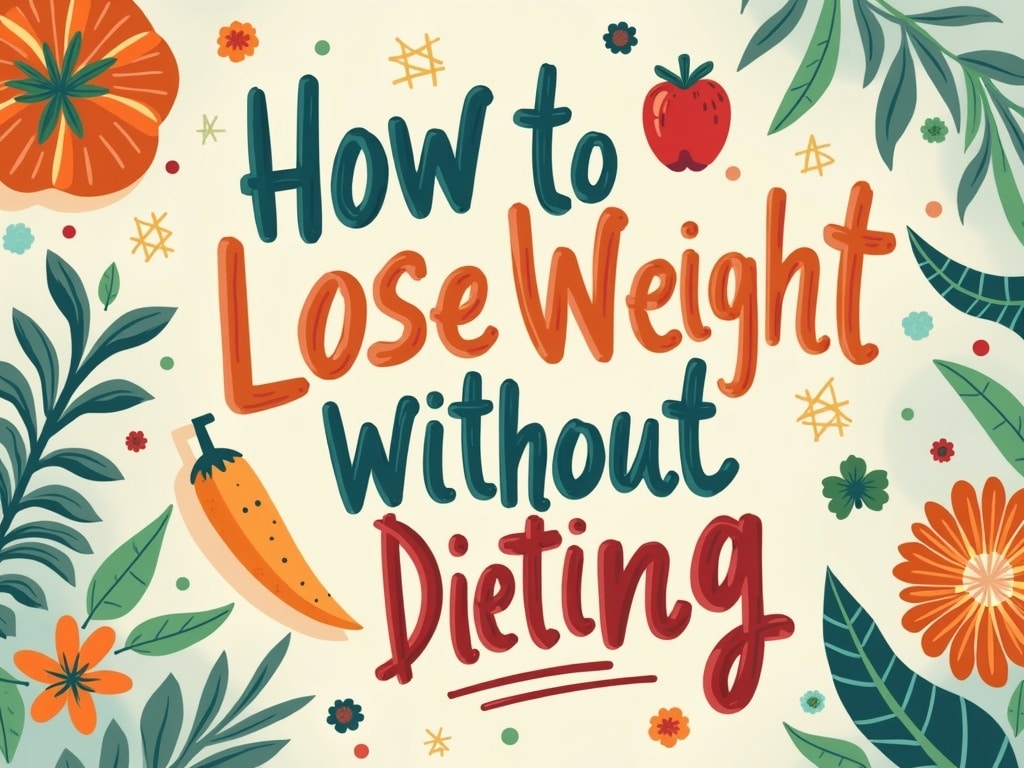How to Lose Weight Without Dieting: Sustainable Strategies for a Healthier You
Tired of the endless cycle of dieting? The restrictive meal plans, the constant calorie counting, the inevitable rebound? You're not alone. For many, the word diet conjures images of bland food and unsustainable restrictions. But what if I told you that you could lose weight without ever going on a traditional diet? It's not a myth; it's about making small, sustainable lifestyle changes that add up to significant results. This guide will explore effective strategies to help you shed those extra pounds and keep them off, all without feeling deprived or trapped in a dieting mindset.
Understanding the Problem with Dieting
Before diving into solutions, it's crucial to understand why traditional diets often fail. Many diets are based on short-term restrictions, leading to a yo-yo effect. You lose weight quickly, only to regain it (and often more) when you return to your normal eating habits. This cycle can be detrimental to your metabolism and overall well-being.
Furthermore, strict diets can trigger feelings of deprivation, leading to cravings and ultimately, a breakdown in willpower. They often ignore the psychological and emotional aspects of eating, focusing solely on calories and macronutrients. This approach can lead to an unhealthy relationship with food, characterized by guilt and anxiety.
The Non-Diet Approach: A Holistic Perspective
The non-diet approach focuses on long-term, sustainable changes that promote a healthier lifestyle. It emphasizes mindful eating, intuitive eating, and building a positive relationship with food. It's about listening to your body's cues, nourishing yourself with wholesome foods, and enjoying your meals without guilt.
Key Strategies for Weight Loss Without Dieting
Here are several practical strategies you can implement to lose weight without ever having to go on a diet:
1. Prioritize Whole, Unprocessed Foods
Focus on filling your plate with foods that are as close to their natural state as possible. Think fruits, vegetables, lean proteins, and whole grains. These foods are generally lower in calories and higher in nutrients, keeping you feeling full and satisfied for longer. They also tend to be free of the added sugars, unhealthy fats, and artificial ingredients that can contribute to weight gain.
- Load up on vegetables: Aim to fill half your plate with non-starchy vegetables like broccoli, spinach, carrots, and bell peppers.
- Choose lean protein sources: Opt for chicken breast, fish, beans, lentils, and tofu.
- Select whole grains: Choose brown rice, quinoa, oats, and whole-wheat bread over refined grains like white bread and pasta.
2. Practice Mindful Eating
Mindful eating involves paying attention to your food, your body's hunger and fullness cues, and the emotional reasons behind your eating habits. It's about slowing down, savoring each bite, and being present in the moment.
- Eat slowly: Put your fork down between bites and focus on chewing your food thoroughly.
- Eliminate distractions: Turn off the TV, put away your phone, and focus solely on your meal.
- Pay attention to hunger cues: Eat when you're hungry and stop when you're satisfied, not stuffed.
- Identify emotional triggers: Be aware of situations or emotions that lead you to eat when you're not hungry.
3. Manage Portion Sizes
You don't have to count calories to manage your portion sizes. Simple techniques can help you control how much you eat without feeling deprived.
- Use smaller plates and bowls: This simple trick can make your portions appear larger.
- Measure your food: Use measuring cups and spoons to get a better sense of appropriate serving sizes.
- Listen to your body: Pay attention to your hunger and fullness cues. Stop eating when you're satisfied, even if there's food left on your plate.
4. Stay Hydrated
Drinking plenty of water is crucial for overall health and can also aid in weight loss. Water helps you feel full, boosts your metabolism, and aids in digestion. Sometimes, we mistake thirst for hunger, leading to unnecessary snacking.
- Carry a water bottle: Keep a water bottle with you throughout the day and sip on it regularly.
- Drink water before meals: This can help you feel fuller and eat less.
- Choose water over sugary drinks: Avoid sodas, juices, and sweetened beverages, which are high in calories and low in nutrients.

5. Prioritize Sleep
Getting enough sleep is essential for weight management. Lack of sleep can disrupt hormones that regulate hunger and satiety, leading to increased cravings and overeating. Aim for 7-9 hours of quality sleep per night to support your weight loss efforts.
- Establish a regular sleep schedule: Go to bed and wake up around the same time each day, even on weekends.
- Create a relaxing bedtime routine: Take a warm bath, read a book, or listen to calming music before bed.
- Optimize your sleep environment: Make sure your bedroom is dark, quiet, and cool.
6. Manage Stress Levels
Chronic stress can lead to increased cortisol levels, which can promote fat storage, particularly in the abdominal area. Find healthy ways to manage stress, such as exercise, meditation, or spending time in nature.
- Practice relaxation techniques: Try deep breathing exercises, yoga, or meditation.
- Engage in enjoyable activities: Make time for hobbies and activities that you find relaxing and enjoyable.
- Connect with loved ones: Spend time with friends and family to reduce feelings of stress and isolation.
7. Incorporate Regular Physical Activity
You don't have to spend hours in the gym to reap the benefits of exercise. Find activities that you enjoy and incorporate them into your daily routine. Aim for at least 150 minutes of moderate-intensity aerobic exercise or 75 minutes of vigorous-intensity aerobic exercise per week.
- Find activities you enjoy: Choose activities that you find fun and engaging, such as dancing, swimming, hiking, or cycling.
- Incorporate movement into your daily routine: Take the stairs instead of the elevator, walk or bike to work, or do some gardening.
- Set realistic goals: Start small and gradually increase the intensity and duration of your workouts.
8. Be Patient and Persistent
Losing weight without dieting is a gradual process. Don't expect overnight results. Be patient with yourself, and celebrate your progress along the way. Focus on making sustainable changes that you can maintain for the long term. Remember that setbacks are normal; don't let them derail your progress. Just get back on track and keep moving forward. Sustainable weight loss is a marathon, not a sprint. Consistency is key.
Dealing with Cravings and Temptations
Cravings are a normal part of life, especially when you're making changes to your diet. The key is to develop strategies for managing them without derailing your progress.
- Identify your triggers: Be aware of situations or emotions that lead to cravings.
- Find healthy substitutes: When a craving strikes, try substituting a healthier option. For example, if you're craving chocolate, try a piece of dark chocolate or a handful of berries.
- Distract yourself: Engage in an activity that takes your mind off the craving, such as going for a walk, reading a book, or talking to a friend.
- Allow yourself small indulgences: Depriving yourself completely can lead to stronger cravings and ultimately, a binge. Allow yourself small indulgences occasionally, but practice moderation.
The Importance of Self-Compassion
Losing weight is a journey, and it's important to be kind to yourself along the way. Don't beat yourself up over slip-ups or setbacks. Treat yourself with the same compassion and understanding that you would offer a friend.
- Practice positive self-talk: Replace negative thoughts with positive affirmations.
- Focus on your strengths: Acknowledge your accomplishments and celebrate your progress.
- Forgive yourself: If you make a mistake, forgive yourself and move on.
Conclusion: A Sustainable Path to a Healthier You
Losing weight without dieting is not about quick fixes or restrictive rules. It's about adopting a holistic approach that focuses on sustainable lifestyle changes, mindful eating, and a positive relationship with food. By implementing the strategies outlined in this guide, you can shed those extra pounds and keep them off, all while enjoying a healthier, happier, and more fulfilling life. Remember, the journey to a healthier you is a marathon, not a sprint. Be patient, be persistent, and most importantly, be kind to yourself along the way.

